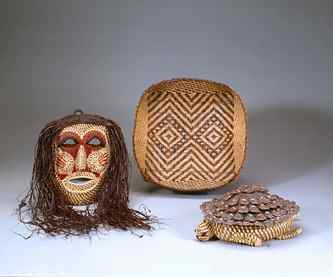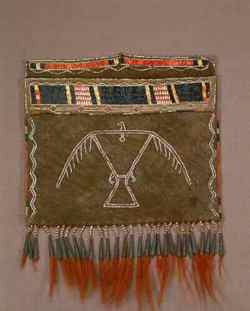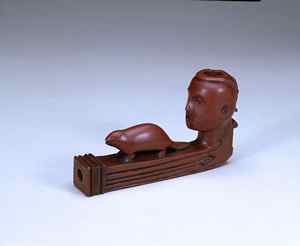Editor's note: The New Orleans Museum of Art provided
source material to Resource Library for the following article. If
you have questions or comments regarding the source material, please contact
New Orleans Museum of Art directly through either this phone number or web
address:
Blue Winds Dancing: The
Whitecloud Collection of Native American Art
November 10, 2007 - February 17,
2008
Unique traditions,
culture, and creativity from the original creators of American Art are captured
in one remarkable art collection and celebrated in the  exhibition Blue Winds Dancing: The Whitecloud Collection
of Native American Art. The exhibition includes over 400 objects, collected
over the last thirty years by Dr. Thomas and Mercedes Whitecloud, which
depict the stories and legacies connecting generations of Native Peoples.
Organized by the New Orleans Museum of Art, Blue Winds Dancing will
be on display November 10, 2007 through February 17, 2008. (right:
Mask, Rose Langley Medford, Coushatta, circa 1980, Pine needles,
raffia; Promised Gift of Mercedes Whitecloud; Fanner Basket, Ronald
Langley, Coushatta, contemporary, Split river cane and commercial dye; Promised
Gift of Mercedes Whitecloud; Large Turtle Basket with Lid, Edna Lorena
Langley, Coushatta, circa 1980, Pine needles, pine cones; Collection of
Renée Whitecloud)
exhibition Blue Winds Dancing: The Whitecloud Collection
of Native American Art. The exhibition includes over 400 objects, collected
over the last thirty years by Dr. Thomas and Mercedes Whitecloud, which
depict the stories and legacies connecting generations of Native Peoples.
Organized by the New Orleans Museum of Art, Blue Winds Dancing will
be on display November 10, 2007 through February 17, 2008. (right:
Mask, Rose Langley Medford, Coushatta, circa 1980, Pine needles,
raffia; Promised Gift of Mercedes Whitecloud; Fanner Basket, Ronald
Langley, Coushatta, contemporary, Split river cane and commercial dye; Promised
Gift of Mercedes Whitecloud; Large Turtle Basket with Lid, Edna Lorena
Langley, Coushatta, circa 1980, Pine needles, pine cones; Collection of
Renée Whitecloud)
Many different cultures and all major regions of the United
States are represented in Blue Winds Dancing, with the strongest
focus on the Southern Woodlands, and also the Great Lakes, the traditional
home of the Chippewa peoples.
Rather than focusing only on ancient objects, the Whitecloud
Collection reflects harmony between historical and contemporary pieces.
"It is equally split between objects made in the historical period
and objects made by contemporary Native American artists," said Paul
Tarver, NOMA's Curator of Native American Art. "The exhibition offers
a diverse look at the arts of Native North Americans including beadwork,
sculpture, pottery, jewelry, baskets, painted objects, and textiles. Every
object tells a story in Blue Winds Dancing, providing a connection
to past, present, and future generations."
Respect for traditions passed from generation to generation
is of specific importance in Native American culture and evident in the
Whitecloud's collection,  particularly
in traditions passed from mother to daughter. "A number of objects
were made by men," says Tarver, "but in the Whitecloud Collection,
95% were made by Native American women." Evidence of this is present
in a room dedicated to a Chitimacha family, the Dardens, who have been making
baskets for eight generations. The Darden women passed their skills and
techniques from generation to generation. (left: Shoulder Pouch,
circa 1780, Chippewa Peoples, Black-dyed buckskin, natural and dyed porcupine
quills, dyed deer hair, metal cones; Collection of the New Orleans Museum
of Art, Gift of Mercedes Whitecloud in memory of Dr. Thomas St. Germain
Whitecloud III. Photo by Judy Cooper.)
particularly
in traditions passed from mother to daughter. "A number of objects
were made by men," says Tarver, "but in the Whitecloud Collection,
95% were made by Native American women." Evidence of this is present
in a room dedicated to a Chitimacha family, the Dardens, who have been making
baskets for eight generations. The Darden women passed their skills and
techniques from generation to generation. (left: Shoulder Pouch,
circa 1780, Chippewa Peoples, Black-dyed buckskin, natural and dyed porcupine
quills, dyed deer hair, metal cones; Collection of the New Orleans Museum
of Art, Gift of Mercedes Whitecloud in memory of Dr. Thomas St. Germain
Whitecloud III. Photo by Judy Cooper.)
"The exhibition focuses on two themes: Sacred Imagery
& Ritual Objects and Secular Objects & Enduring Traditions,"
says Tarver. A journey through the exhibition reveals how Native American
spirituality and mythology are reflected in the arts. Objects include beautifully
carved wood sculpture and stone pipes, and elaborately beaded and quilled
objects such as bandoleer bags, moccasins and pipe bags. An extraordinary
example of an ordinary object endowed with spirituality is an Eastern Chippewa
buckskin and porcupine quill pouch (18th century). The front of the pouch
depicts a quilled image of a thunderbird, a mythical spirit being. The pouch
is functional, but the thunderbird symbol is sacred. The design of the pouch
may have come from European soldiers who used a similarly styled pouch to
carry gunpowder. However, the design and decoration for the Chippewa pouch
suggests its purpose served more of a ritual function.
The objects in the Whitecloud Collection have a power photographs
and words can only begin to describe. Seeing these objects up-close in the
exhibition is a testament to the strength of craftsmanship and artistry
in Native American art. The exhibition provides a visual narrative that
communicates a power and strength of a culture with many enduring traditions.
Demonstrating the rich and powerful aesthetic traditions
evident in Native American art, the exhibition also includes objects created
by contemporary artists. "One of the things that is unique about our
collection is the fact that we collect artifacts as well as contemporary
pieces," says Mercedes. "We have a strong identity with enduring
traditions." Artists such as the Plains bead-workers Joyce and Juanita
Growing Thunder and the Choctaw bead-worker Jerry Ingram demonstrate that
Native American traditions are alive and thriving. Traditional beaded and
quilled items, such as clothing, dolls and horse masks, as well as new approaches
to ceramics, jewelry and easel painting are included in Blue Winds Dancing.
About Dr. Thomas and Mercedes Whitecloud
Sharing the culture and creativity of Native American regions
across the United States and Canada, Blue Winds Dancing: The Whitecloud
Collection of Native American Art is the story of one family's dedication
to preserving and collecting Native American art and culture from generation
to generation. Organized by the New Orleans Museum of Art, Blue Winds
Dancing will be on display November 10, 2007 through February 17, 2008.
The art of storytelling is integral to Native American
culture, and there are no better stories than those told through the objects
in the collection of Thomas St. Germain Whitecloud, III (1940- 2003), and
his wife, Mercedes. A lifetime's worth of collecting extraordinary objects
is reflected in this collection which not only shares the tastes and world
views of the Whiteclouds, but also their individual backgrounds and passions.
More than storytellers, the Whiteclouds are modern-day legend keepers,
upholding the dignity and honoring the spirit of Native American cultures
in their collection.
"The Whitecloud Collection is particularly unique
because it is a private collection put together with Native American eyes,"
says Paul Tarver, Curator of Native American Art at the New Orleans Museum
of Art.
Though born in New Orleans, Louisiana, Tom Whitecloud was
of Chippewa descent with ancestry from the Lac De Flambeau reservation in
Wisconsin (the French translation meaning "lake of the flaming torches"
given by fur traders who discovered Chippewa Indians fishing by torchlight
at night from their birchbark canoes). He was a faculty member in the Department
of Orthopaedics at the Tulane University School of Medicine from 1972 and
was Chair of  Orthopaedic Surgery
from 1991 until his death. He was a pioneer in Orthopaedic surgery and
his interest in medicine was evident even as a child when he assisted his
father (Dr. Thomas St. Germain Whitecloud, II.) in surgery. As a champion
of diversity, Tom was also a charter member of the Association of American
Indian Physicians and was President of the Association in 1981. (right:
Pipe Bowl with Human Head and Beaver, circa 1820-25, Chippewa Peoples,
Catlinite; Promised Gift of Mercedes Whitecloud)
Orthopaedic Surgery
from 1991 until his death. He was a pioneer in Orthopaedic surgery and
his interest in medicine was evident even as a child when he assisted his
father (Dr. Thomas St. Germain Whitecloud, II.) in surgery. As a champion
of diversity, Tom was also a charter member of the Association of American
Indian Physicians and was President of the Association in 1981. (right:
Pipe Bowl with Human Head and Beaver, circa 1820-25, Chippewa Peoples,
Catlinite; Promised Gift of Mercedes Whitecloud)
Tom married Mercedes Bordelon in 1965; in 1967 they began
collecting Native American art together. Mercedes's passion and expertise
is in Native American basketry, with particular emphasis on Southeastern
baskets. Originally of Abbeville, Louisiana, Mercedes has had a lifelong
interest in textiles and baskets. She brings to the exhibition a collection
of over 225 baskets, 80 of which are from Louisiana Chitimacha basketmakers;
the largest number of Chitimacha baskets ever to be exhibited in a museum.
The Louisiana Chitimacha baskets mark a milestone for NOMA and the Southern
region as they represent some of the most advanced and beautiful baskets
in North America.
Tom began collecting Native American art as early as 1950
while traveling across the United States with his parents. The exhibition,
Blue Winds Dancing, celebrates the generous gift of the Whitecloud Collection
to the New Orleans Museum of Art and commemorates the life and achievements
of Dr. Thomas St. Germain Whitecloud, III. Their collection includes works
of art from over 30 indiginous cultures spanning the North American continent.
"Native American peoples have this tremendous range
of materials because they used whatever was indigenous," said Mercedes.
"It gives a marvelous range and depth to the basketry culture."
Not limited to the basketry culture, the Whitecloud Collection also represents
the richness and diversity of objects found all across the North American
continent.
Unlike many art collections, the Whitecloud Collection
is not based merely on its value, but the personality, character and history
of the individual items. Blue Winds Dancing includes works of art
from baskets to jewelry, original clothing to quillwork and pottery to sculpture.
Over 400 remarkable objects collected over the last thirty years will be
on display, each telling a different story from generations of Native Peoples.
Please click here to view
the exhibition checklist.
Editor's note: RL readers may also enjoy:
Read more articles and essays concerning this institutional
source by visiting the sub-index page for the New
Orleans Museum of Art in Resource Library.
Visit the Table
of Contents for Resource Library.for thousands
of articles and essays on American art.
Copyright 2007 Traditional Fine Arts Organization, Inc., an Arizona nonprofit corporation. All rights
reserved.
 exhibition Blue Winds Dancing: The Whitecloud Collection
of Native American Art. The exhibition includes over 400 objects, collected
over the last thirty years by Dr. Thomas and Mercedes Whitecloud, which
depict the stories and legacies connecting generations of Native Peoples.
Organized by the New Orleans Museum of Art, Blue Winds Dancing will
be on display November 10, 2007 through February 17, 2008. (right:
Mask, Rose Langley Medford, Coushatta, circa 1980, Pine needles,
raffia; Promised Gift of Mercedes Whitecloud; Fanner Basket, Ronald
Langley, Coushatta, contemporary, Split river cane and commercial dye; Promised
Gift of Mercedes Whitecloud; Large Turtle Basket with Lid, Edna Lorena
Langley, Coushatta, circa 1980, Pine needles, pine cones; Collection of
Renée Whitecloud)
exhibition Blue Winds Dancing: The Whitecloud Collection
of Native American Art. The exhibition includes over 400 objects, collected
over the last thirty years by Dr. Thomas and Mercedes Whitecloud, which
depict the stories and legacies connecting generations of Native Peoples.
Organized by the New Orleans Museum of Art, Blue Winds Dancing will
be on display November 10, 2007 through February 17, 2008. (right:
Mask, Rose Langley Medford, Coushatta, circa 1980, Pine needles,
raffia; Promised Gift of Mercedes Whitecloud; Fanner Basket, Ronald
Langley, Coushatta, contemporary, Split river cane and commercial dye; Promised
Gift of Mercedes Whitecloud; Large Turtle Basket with Lid, Edna Lorena
Langley, Coushatta, circa 1980, Pine needles, pine cones; Collection of
Renée Whitecloud) particularly
in traditions passed from mother to daughter. "A number of objects
were made by men," says Tarver, "but in the Whitecloud Collection,
95% were made by Native American women." Evidence of this is present
in a room dedicated to a Chitimacha family, the Dardens, who have been making
baskets for eight generations. The Darden women passed their skills and
techniques from generation to generation. (left: Shoulder Pouch,
circa 1780, Chippewa Peoples, Black-dyed buckskin, natural and dyed porcupine
quills, dyed deer hair, metal cones; Collection of the New Orleans Museum
of Art, Gift of Mercedes Whitecloud in memory of Dr. Thomas St. Germain
Whitecloud III. Photo by Judy Cooper.)
particularly
in traditions passed from mother to daughter. "A number of objects
were made by men," says Tarver, "but in the Whitecloud Collection,
95% were made by Native American women." Evidence of this is present
in a room dedicated to a Chitimacha family, the Dardens, who have been making
baskets for eight generations. The Darden women passed their skills and
techniques from generation to generation. (left: Shoulder Pouch,
circa 1780, Chippewa Peoples, Black-dyed buckskin, natural and dyed porcupine
quills, dyed deer hair, metal cones; Collection of the New Orleans Museum
of Art, Gift of Mercedes Whitecloud in memory of Dr. Thomas St. Germain
Whitecloud III. Photo by Judy Cooper.) Orthopaedic Surgery
from 1991 until his death. He was a pioneer in Orthopaedic surgery and
his interest in medicine was evident even as a child when he assisted his
father (Dr. Thomas St. Germain Whitecloud, II.) in surgery. As a champion
of diversity, Tom was also a charter member of the Association of American
Indian Physicians and was President of the Association in 1981. (right:
Pipe Bowl with Human Head and Beaver, circa 1820-25, Chippewa Peoples,
Catlinite; Promised Gift of Mercedes Whitecloud)
Orthopaedic Surgery
from 1991 until his death. He was a pioneer in Orthopaedic surgery and
his interest in medicine was evident even as a child when he assisted his
father (Dr. Thomas St. Germain Whitecloud, II.) in surgery. As a champion
of diversity, Tom was also a charter member of the Association of American
Indian Physicians and was President of the Association in 1981. (right:
Pipe Bowl with Human Head and Beaver, circa 1820-25, Chippewa Peoples,
Catlinite; Promised Gift of Mercedes Whitecloud)